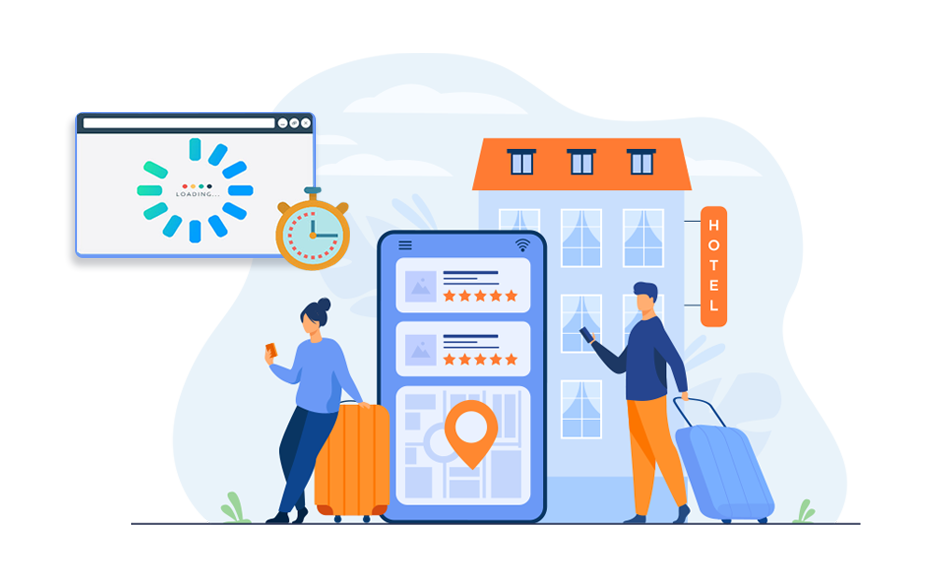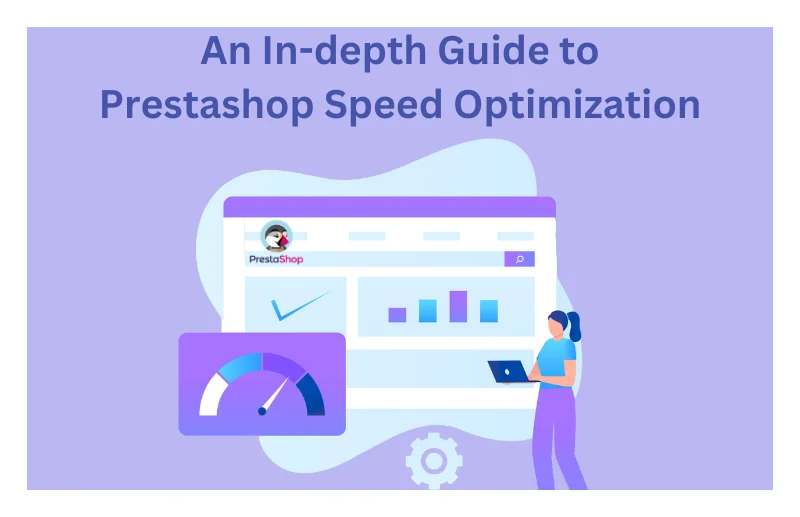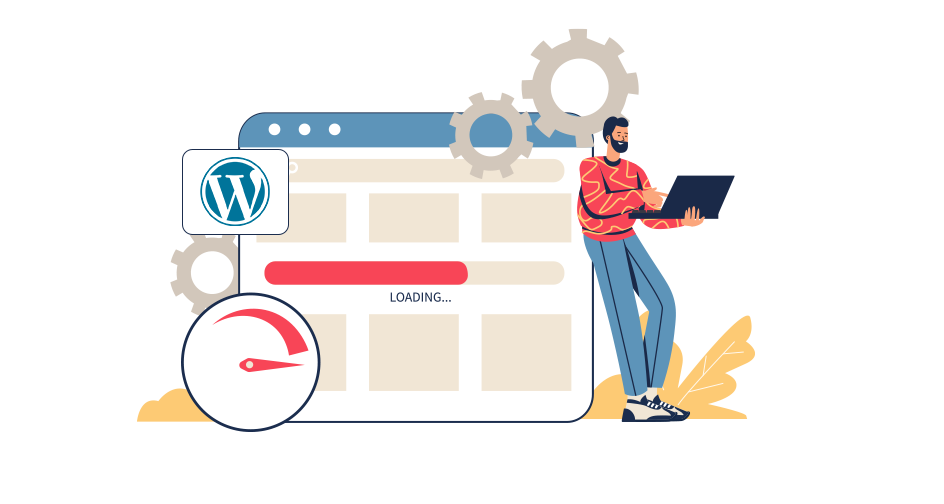TL;DR: A slow hotel website speed costs real bookings and revenue. Even a few seconds of delay can drive travelers to competitors, reduce your visibility on search engines, and lower trust in your brand. Optimizing site speed, especially for mobile users, improves conversions, boosts direct bookings, and strengthens guest experience. Faster sites win more guests and more profit.
Your hotel website is your first impression and your fastest salesperson. A few seconds can either break or make a booking. When travelers search online, they expect instant results and hassle-free experiences. If your hotel website speed is slow, those few seconds might be costing you real revenue.
Studies show that over half of the visitors abandon a site that loads in more than 3 seconds, and in hospitality, that means they’re booking elsewhere.
Any delay, shattered image, or lagging booking page silently tears the trust of the guests. Slow-loading hotel websites don’t just frustrate users, but also directly impact revenue, reputation, and guest perception.
Investing in website speed optimization guarantees a smooth process for your visitors. Now, it’s time to unpack why site speed matters for hotel bookings and how faster performance can directly increase conversions and revenue.
How Speed Affects Guest Decisions For Hotel Bookings
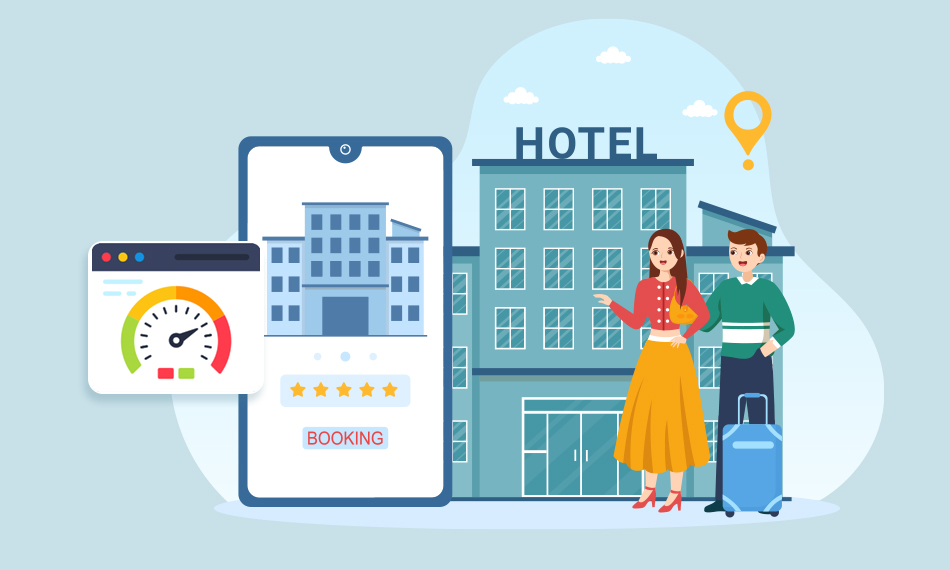
Your website’s loading speed shapes how travelers are going to view your hotel before they even see your rooms. It’s more of a trust metric.
The First Impression Is Made Online
Before your guests step into your lobby, they have already made a judgment about your property based on how your site performs. A site that loads slowly, freezes, or displays odd layouts under mobile will send a silent message: “This hotel may not care about experience.”
According to Screaming Frog, bounce rate increases by around 32% when the page loading time goes from 1 second and 3 seconds. It can also jump to 90% at a 5-second load time.
Lost Conversions = Lost Revenue
Studies show the hospitality industry is underperforming when it comes to performance metrics. In one dataset, 73% of the hotel sites had a Largest Contentful Paint (LCP) of over 2.5 seconds; 28% had LCP at 4.0 seconds or slower. Slow loading equates directly to lost bookings, as booking decisions involve trust, payment details, and real money.
Search & Visibility Take a Hit
Search engines consider performance to be a ranking signal. A sluggish site reduces your visibility, particularly on mobile searches, where most travelers start their online hotel bookings. A delayed site also drives up bounce rates, which can further degrade your SEO.
What “Slow” Really Means for Hoteliers
Speed issues aren’t just about tech but also about guest experience and lost revenue opportunities. Let’s break down what slow really costs you.
1. The Booking Funnel Loses Momentum
Imagine a visitor clicks on a metasearch ad, lands on your homepage, and then waits as images load, the booking widget jitters, or the mobile layout shifts. Instantly, hotel site speed becomes the invisible friction that forces guests to leave. Conversion is killed by that momentum.
2. Mobile Is Now the Default
More than half of hotel bookings are made on mobile. If the mobile users experience lag, the abandonment rate goes up dramatically. The mobile experience should be fast, responsive, and distortion-free.
3. Direct Bookings Are Far More Valuable
Booking directly on your property’s site tends to bring higher revenue per booking compared to third-party platforms. What this implies: optimizing your site doesn’t only mean more bookings, but more profitable ones.
Practical Examples of What Slows Your Site Down
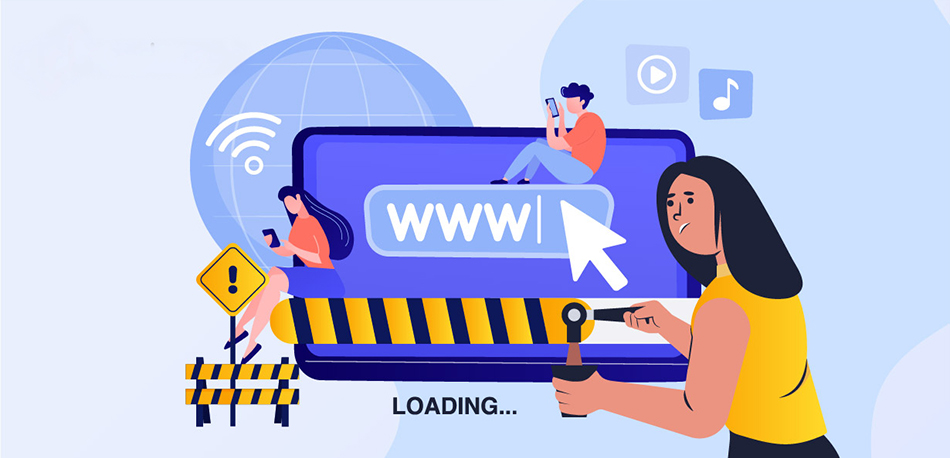
It’s not always evident what’s slowing down your Hotel site. Often, it’s small technical choices that gradually accumulate and cost you conversions.
Large, Unoptimized Images
Hotels are characterised by rich visuals: rooms, facilities, and destinations. But oversized or uncompressed photos dramatically slow load time.
Too Many Third-Party Scripts
Booking widgets, chat boxes, and analytics scripts are all handy, but each one adds latency. Failure to manage these appropriately turns them into bottlenecks.
Poor Hosting or Lack of Global Reach
A local server-based site may perform fine for nearby visitors, but struggle for international guests. Hotels targeting global markets need to ensure that they perform consistently across geographies.
How to Improve Hotel Website Performance
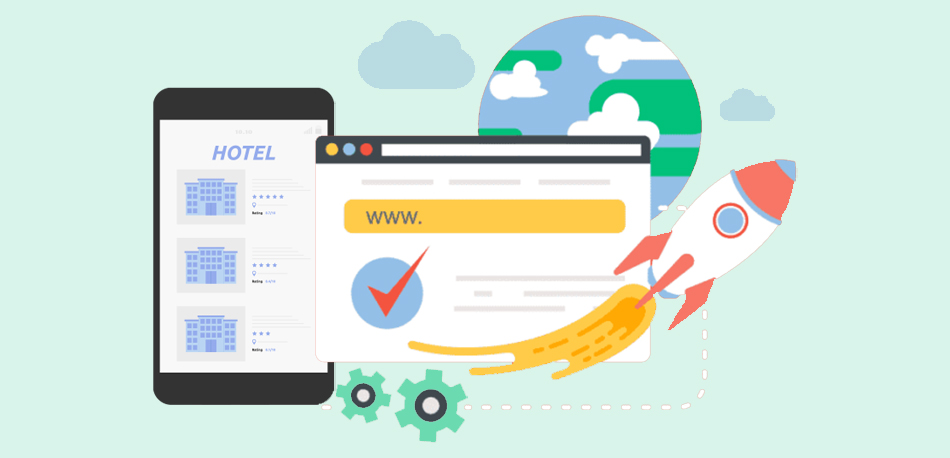
There’s no need to rebuild your site completely, but you only need to concentrate on the core areas contributing the most to the speed and usability.
1. Optimize Key Performance Metrics
Pay attention to such Core Web Vitals as LCP, INP, and CLS to provide fast, stable experiences. These are Google’s benchmarks for real-world speed.
2. Compress Images and Use Modern Formats
Switch bulk visuals to WebP or AVIF, and implement lazy-loading so below-the-fold images load only when needed. By using tools like Image Optimizer Pro, you can reduce file size and optimize images automatically.
3. Audit and Reduce Third-Party Dependencies
Review all external scripts and widgets. Ask: Is this essential? Can it be deferred or optimized?
4. Upgrade Hosting and Use a CDN
Make sure your infrastructure can accommodate the traffic and geographical distribution you target. A CDN enables content to be loaded quickly for international visitors.
5. Mobile-First Design & Booking Flow
Since mobile traffic dominates, design your site and booking engine with mobile in mind. Simplify forms, eliminate redundancy, and ensure your booking engine is fast and smooth.
6. Taking Help from a Reliable Speed Optimization Tool
A website speed optimizer tool like Website Speedy can prove to be very useful, helping you achieve faster load times with minimal technical effort. It analyzes your site and applies advanced optimization techniques such as lazy loading.
Real-World Impact: Case in Point
When hotels fix performance issues, the result is almost instant – higher engagement, better conversion rates, and happier guests.
A mid-sized hotel optimized its booking engine and reduced its load time on mobile by 1.8 seconds. Within six months, direct bookings increased by 32% and the mobile conversion rate improved by 45%.
This shows how the technical gains can translate into real business outcomes, more bookings, higher conversion rates, and less reliance on OTAs (Online Travel Agencies).
Why Improving Speed Pays Off Beyond Bookings
Speed isn’t only about how fast your site loads, but is about creating a better brand experience that guests trust and remember.
- Better Guest Experience: Fast, slick sites build confidence.
- Lower Ad Waste: Landing page speed impacts how much you pay for clicks and how many convert.
- Stronger Brand Perception: A smooth digital experience implies quality and professionalism.
- Higher Profitability: More direct bookings reduce commissions and allow you to capture the full value of a stay.
Conclusion
Fast hotel websites aren’t an easy luxury, but a competitive requirement. When your site drags, every second of delay chips away at trust, conversion, SEO visibility, and direct revenue. You are checking a tech checklist by concentrating on performance, optimizing visuals, simplifying scripts, and upgrading infrastructure. You’re improving guest experience, boosting direct bookings, and protecting your bottom line.
In a market where every click matters, don’t let slow-loading pages be the roadblock between you and your next guest.












































